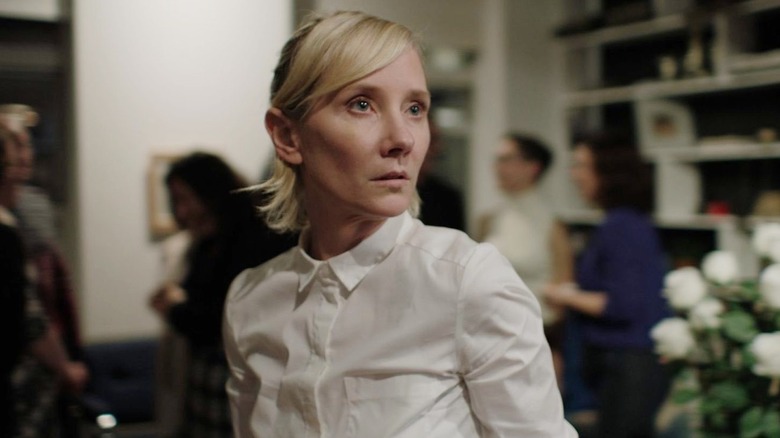
Anne Heche deserved better in every way.
Her horrific treatment in the public eye led to her being pigeon-holed as the butt of a very cruel and stupid joke that bisexual people just can't make up their minds. Even now in death, publications ridicule her dating history as if it's some mystery to be solved. As if queer, bisexual, and pansexual people are a fun little eccentricity, a source of entertainment and confusion. "You mean she likes both men and women? But how!?"
Listen, just because your pedestrian little mind can't comprehend the notion of anything beyond yourself, doesn't mean those people and ways of life don't exist. They do, and they're completely valid. But until her dying day, Heche was never afforded the decency of being taken seriously as a survivor of abuse, an addict, or a queer woman.
The Punchline
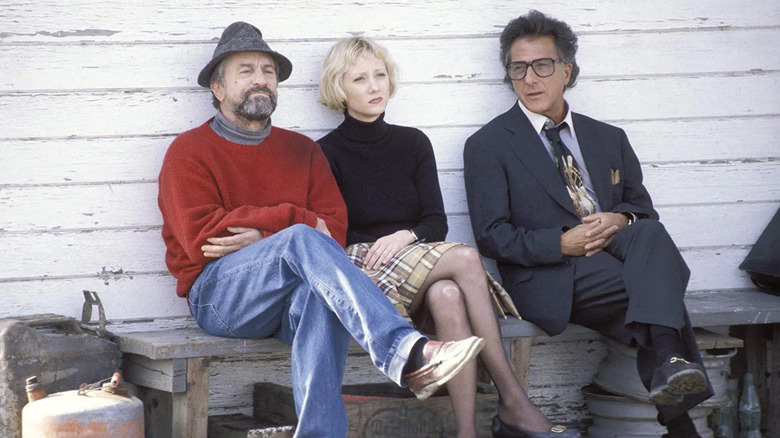
I was so young when Heche and DeGeneres were a couple. I was about 10 years old, so that specific discourse wasn't even on my radar. But I came to know Heche as the woman who couldn't make up her mind, regardless of the fact that she seemed to make perfect sense to me.
I'm reminded of a specific moment in "Robin Williams Live On Broadway." It was probably one of the first stand-up specials I came to on my own, and I loved it. But there was a very specific part that always made me feel a little ... funny.
Within the first 10 minutes of Williams' stand-up special for HBO, he starts talking about the weather, swiftly pivoting toward using Heche's very public sexuality as the punchline. "This Spring," he said, "flowers were like Anne Heche going, 'I'm out! I'm in! I'm out! I'm in! I don't know where to go!'" I remember laughing along because my friends did. The audience roared so clearly it was funny! But it also made me crawl back into myself, and made me feel like hiding. I wouldn't come out as pansexual until I was in my late 20s, and impactful rhetoric like this was a very big contributing factor. I doubt I was the only one.
But that was the prevailing perspective at the time and continued to be for more than 20 years. That Anne Heche was just a crazy lady who couldn't decide who she wanted to sleep with, and that she couldn't be trusted.
'The One Who Got Away'
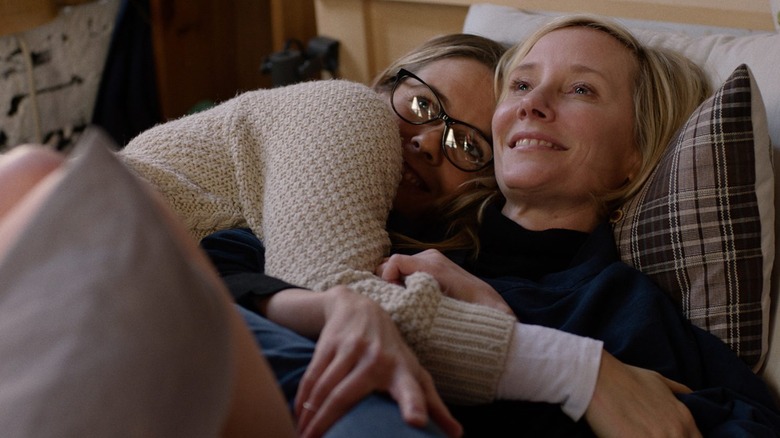
A relative newcomer when she and DeGeneres got together, Heche was immediately spoken about as if she wasn't a part of her own discourse, and not just by the tabloids. In 1997, The New York Times published the article "Problem for Hollywood: DeGeneres's Companion," saying the following in its opening paragraph:
"The decision by Anne Heche, a fast-rising 27-year-old actress and potential movie star, to reveal that she is in a lesbian relationship with the comedian Ellen DeGeneres has confronted Hollywood with a highly delicate problem: how to deal with a gay actress whose career has been built on playing heterosexual roles."
That same year, Esquire dubbed her "The One Who Got Away," as if straight folks had lost their shot. "That was hysterical," Heche later said in an interview with The Advocate, "Like I was owned."
When she married Coley Lafoon in 2001, every romantic decision she'd made up until that point became the subject of heavy scrutiny and public ridicule, from tabloids and mainstream outlets and celebrities alike, including the likes of Robin Williams.
Deemed A Fraud
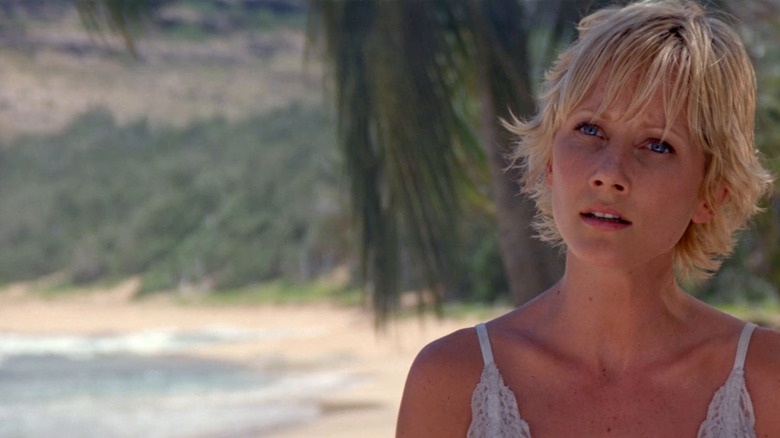
Referring to Heche's relationship with Ellen DeGeneres, The Los Angeles Times callously asked in a 2001 interview, "Do you recognize that people are more interested in this aspect of your life than your work?" She was doing a book tour to promote her autobiography, "Call Me Crazy." Her interview with The Advocate on that same press tour was even more brutal, shockingly so. On top of actively questioning her sexuality, the interviewer questioned the validity of her previous relationships, her relationship with Lafoon, and scrutinized her decision to get married at all because of her advocacy for the LGBTQ+ community. In response to being told "if you cross the boundary, it'll bite you. And it did," Heche said "God, do not diminish this to 'I left her because I was not gay.' That makes me so angry because it makes my commitment not truthful!"
Stockwell's reply? "Anybody who's seen your work knows you're a great actor. Do you see an Oscar in your future?"
She even questioned the validity of Heche's abuse as a child at the hands of her father, stating "Statistically it's heterosexual men, not gay men, who molest girl children," and flat out asking, "But why would a gay man rape a girl?" She grilled Heche about the use of the word "abuse" over "incest" as if there was something to prove.
She Was Alone
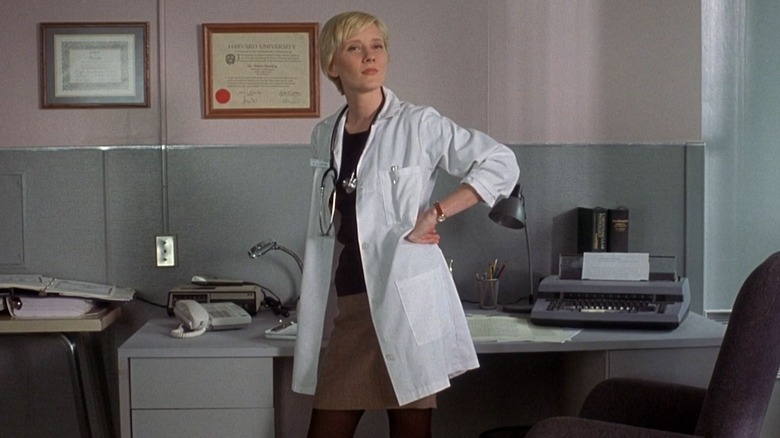
She was ridiculed by the general public en masse and shunned by the very queer community she fought to protect.
There were multiple pervasive narratives that surrounded Heche's queerness, including one of the more insidious ones that while she chose to date a woman, she was really straight. She was blamed by the queer community for society's perception of sexuality as a choice and made to feel guilty for existing in both straight- and queer-presenting relationships; she couldn't win. As a survivor of horrific abuse, and someone who lived a heterosexual-presenting life for the sake of self-preservation, it was incredibly harmful to her overall wellbeing. It certainly didn't help that in the late '90s and early 2000s, Heche was ridiculed for her coping mechanisms, including what ABC News referred to as "Anne Heche's Lost Weekend" and what People dubbed "The Anne Heche Mystery."
Heche was spoken to and about with horrific callousness by virtually everyone in the media. She was scrutinized and ridiculed while being held to a very specific standard by everyone. As a queer woman before the term "bisexual" was widely understood or even used, she was alone. Completely and utterly alone.
The Canary In The Cultural Coal Mine
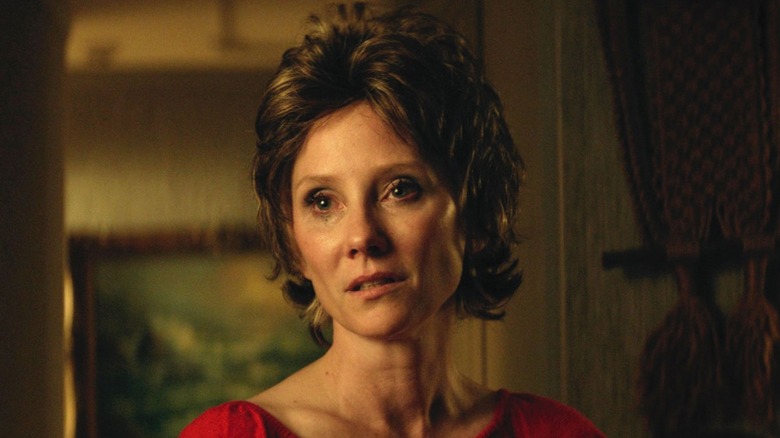
The way Anne Heche was treated was so horrible and so public that it undoubtedly had far-reaching ramifications for the safety and well-being of other queer people, including bisexuals and pansexuals like myself. Growing up with that rhetoric was particularly traumatizing because it never made sense. Why would it be confusing that she would like both men and women? I did. I assumed other people did, too. But now, seeing how her unconventional approach to labels and sexuality for the time was received, clearly I was wrong. I had to be. Everyone was laughing, so I must've just ... missed something. Even about myself.
"Call me anything you want — I don't call me anything," Heche said decisively in her interview with The Advocate. "The labeling's about what makes you feel comfortable." Even in 2001, Heche was far ahead of her time. 21 years ago, sexuality really was widely perceived as a binary system. If you were a man who liked men, you were gay. A woman who liked women, a lesbian. Otherwise, you were straight, and that's that. Heche, meanwhile, threw that into flux in a very public way around the same time Ellen DeGeneres very publicly came out and was branded a hero.
She became the canary in the cultural coal mine, letting the world know that they were not ready for complex discussions about queerness.
Read this next: /Film's Top 10 Movies Of 2021
The post Anne Heche Was The Canary In The Cultural Coal Mine, And She Deserved Better appeared first on /Film.
0 Comments